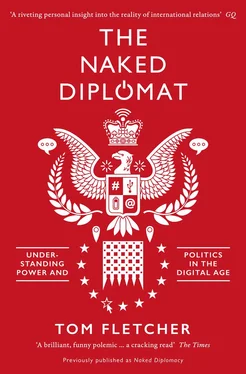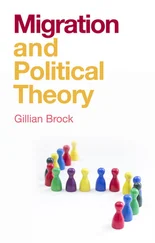1 ...8 9 10 12 13 14 ...17 Wars are of course another powerful tool for domination, and the Renaissance had plenty of them. But they are also disruptive and costly for leaders. Increasingly, princes wanted people who could build their influence in other ways. They needed local intelligence, and eyes and ears on the ground. Milan sent the first ambassador to the French court, in 1455, and Spain despatched the first permanent representative, to London in 1487. These tended to be noblemen, able to finance the lavish lifestyle meant to come with the territory. An embassy came to mean a physical presence rather than a formal visit.
Advisers such as Machiavelli began to build a theory of power around this work. These early envoy roles were sought-after positions held by the talented innovators and explorers of the age. Men such as Dante, Petrarch and Boccaccio were among the first envoys of Florence. This is like making Damien Hirst, Sebastian Faulks and Ian McEwan Britain’s ambassadors today. For these early envoys, diplomacy was not a career but a pursuit, one that reinforced their social position and cultural instincts. Early forms of the word ‘ambassador’ – ambaxade , ambasciatore , ambaxada – seem to have derived from ambactia , meaning charge or office. Or perhaps ambactus , servant. Even at its well-heeled origins, I like to think that there was a sense of public service to the description.
Inevitably, an informal network of travellers and messengers became more structured. Leaders needed to know that the man in front of them – and of course in this era it always was a man – was really representing his prince. So the tradition of presenting credentials on arrival, which continues to this day, began.
Many diplomats are still communicating with their host government and their own capital using these gloriously archaic instruments. On arrival in a country, the ambassador is not meant to meet anyone officially until he has presented his credentials to the head of state, a process that can often undermine his impact during the most important period. While the private sector focuses on the first ninety days of a CEO’s tenure, the ambassador often spends their first weeks marooned in their house, unpacking and waiting for permission to hand over a piece of paper. When it comes, the ceremony can be moving and memorable – the hairs on the back of my neck stood up when I listened to the British national anthem at the president’s summer palace high in the Shouf mountains of Lebanon in August 2011. But the protocol gets in the way of real diplomacy.
Much of the language remains more Renaissance than Digital Age. Here is an extract from my credentials, which perhaps shows that modern diplomats have not travelled as far from our lace-cuffed predecessors as the smartphones in our pockets suggest:
To All and Singular to whom these Presents shall come, Greeting!
Whereas it appears to Us expedient to nominate some Person of approved Wisdom, Loyalty, Diligence and Circumspection to represent Us in the character of Our Ambassador Extraordinary and Plenipotentiary at Beirut; Now Know Ye that We, reposing especial trust and confidence in the discretion and faithfulness of Our Trusty and Well-beloved Thomas Fletcher, Companion of our Most Distinguished Order of St Michael and St George, have nominated, constituted and appointed as we do by these Presents nominate, constitute and appoint the said Thomas Fletcher to be Our Ambassador Extraordinary and Plenipotentiary at Beirut as foresaid.
Giving and granting him in that character all Power and Authority to do and perform all proper acts, matters and things which may be desirable or necessary for the promotion of relations of friendship, good understanding and harmonious intercourse between Our Realm and the Republic of Lebanon and for the protection and furtherance of the interests confided to his care; by the diligent and discreet accomplishment of which acts, matters and things aforementioned he shall gain Our approval and show himself worthy of Our high confidence.
Terrific stuff, but hard to tweet.
The letter of credence was established to show that an envoy was genuinely representing his state, when there were not other ways to check thoroughly. That’s now easier to establish. Credentials can be replaced by a Google search.

Not every historical leader appreciated the new customs either. When Anthony Jenkinson, a sixteenth-century trader, traveller and envoy of Elizabeth I, tried to present credentials to the cosmopolitan Persian emperor Shah Tahmasp, he failed to wear the slippers offered to cover his infidel feet, was thrown out of Isfahan and his footprints back to the port covered in sand. He was Photoshopped out of Persian history.
As the number of diplomats attached to royal courts grew, they inevitably began to compete for attention and influence. With their masters jostling for power and prestige, diplomats in European capitals were ranked on the basis of the power of their monarchs, a fiendishly complex and contested process. This rivalry consumed much of their energies, and would strike terror in the heart of the modern diplomat less used to having to compete so overtly for attention and influence.
According to Samuel Pepys, the Spanish and French embassies in London frequently came to blows in the 1660s over breaches of such protocol and ranking. Asked where he would like to sit at a dinner with the English king, Charles II, the French ambassador answered: ‘Discover where the Spaniard desires to sit, then toss him out and put me in his place.’ I admit that I have attended many diplomatic dinners where such dark thoughts have crossed my mind. But fortunately for less adversarial modern diplomats, ranking is now based on your date of arrival in post.
Another account describes how, during the 1661 arrival of a new Swedish ambassador to London, the French coach (with 150 men, forty of them armed) clashed with that of the Spanish ambassador, similarly tooled up. The Spaniards killed a Frenchman and took down two French horses, forcing the French to reluctantly cede the second position in the procession. Louis XIV of France was so incensed that he told his Spanish counterpart that he would declare war if there were ever to be another such breach of protocol.
But such clashes continued – in 1768, the Russian and French ambassadors to London duelled following a dispute over who should sit where in the diplomatic box at the opera. The modern equivalent is the competition to be seated next to the US president at international summits. Alphabetical orderings can often be the most diplomatic solution. At these moments, British diplomats tend to favour the use of ‘United Kingdom’ over ‘Great Britain’. It gets the leader closer to their American counterpart, and safely clear of the difficult group of countries whose names begin with ‘I’.
Diplomacy can both thrive and suffer in times of intrigue and change. The cold war that followed the Reformation set back the process of statecraft, with Catholic or Protestant ambassadors frequently seen, with some justification, as the centres of intrigue and espionage in rival courts. Yet it forced those envoys still allowed to lurk behind the curtains of those courts to make their communication with their capitals more cunning, and increased their value to their masters. 4In the 1630s, Cardinal Richelieu, one of Louis XIII’s most infamous and effective ministers, wrote of the need for ceaseless negotiation, even when – in fact especially when – no fruits are reaped. After 1626, he established a Ministry of External Affairs to centralise the management of foreign relations under a single roof, and – perhaps most importantly to him – to control the information reaching his king. The practice was soon followed all over Europe. A picture of the ‘Red Eminence’ should be on the wall of every modern ministry of foreign affairs.
Читать дальше













